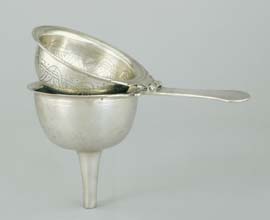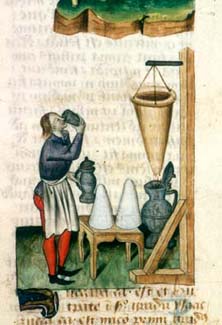- Glass Making in Roman Times
- Roman Wine: A Window on an Ancient Economy
- Roman Wine: Windows on a Lifestyle
- Fine Glassware in the Roman World
- Reuse of Images in the Art of Rogier van der Weyden
The Straining of Wine: An Ancient Debate

Silver strainer and funnel
Chaourse, in France
Mid 3rd century A.D.

"The sleeve of Hippocrates"
Detail from the 15th century codex
Tractus de Herbis.
Was it right to strain wine?—some thought it was, some thought not. An exchange between a convivium guest, Nigros, and his host, Aristion, gives us the gist of the opposing viewpoints on this matter (see Plutarch Table Talk VI.7).
Nigros argued that wine should be drunk straight from the jar:
"Purifying it cuts out its sinew and quenches its fire. There is a loss of bloom and a dissipation of the bouquet from the repeated straining. And the practice reflects a tendency to over-refinement, vainglory and luxury, and sacrifices the useful in favor of the pleasurable. To castrate pigs and cocks, making their flesh unnaturally soft and effeminate is typical of men whose health and character are ruined by gluttony.. and Homer somewhere...is accustomed to apply to wine the adjectives 'fiery-looking' (aithops) and "red,' and not—as Aristion serves it—'pale' and 'bilious-looking' from excessive purification."
Because he was comfortable with Nigros' implied criticism of soft-living Greeks and praise for traditional Roman robustness, Aristion responded with laughter:
"Not bilious-looking, my dear fellow, nor bloodless, but mellow and sunny, as appears first of all in its face...and you find fault with purification in terms that suggest the purging of bile; actually, it a means to rid the wine of heavy, intoxicating, morbid elements and make it light in the mixture and free from anger...."
The frequency with which wine-strainers occur in extant sets of Roman wine vessels does suggest, however, that Aristion's opinion generally prevailed. Charcoal was usually used as the purifying agent then as it is today, though there were other novel ideas around in those times:
"If you set Massic wine beneath a cloudless sky, all its coarseness will be toned down, and the scent, unfriendly to the nerves, will pass off. But the same wine, when strained through linen, is spoiled, losing its flavor. A knowing man mixes Surrentine wine with lees of Falernian, and carefully collects the sediment with pigeons' eggs, for the yolk sinks the bottom, carrying with it all foreign matter." (Horace, Satires II.iv)
REFERENCES
- Gowers, E. 1996: The Loaded Table, 66-76 (Oxford: Clarendon).
- Oliver, A. Jr., 1977: Silver for the Gods, 126-131 (Toledo Museum of Art).